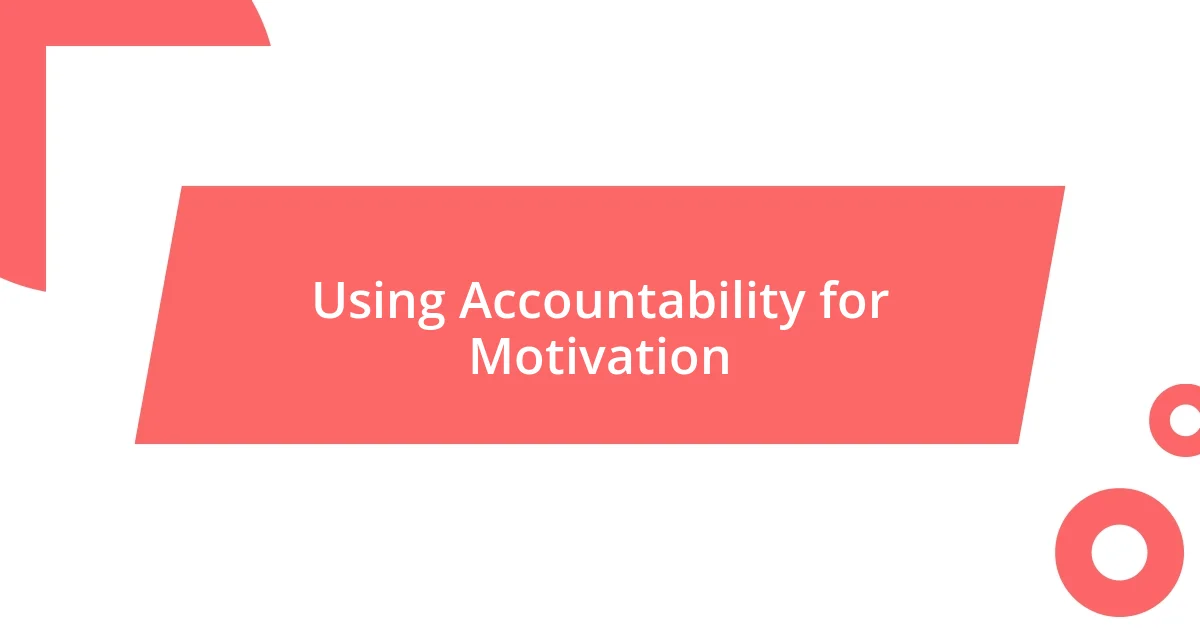Key takeaways:
- Inspiration can be found in nature, the stories of others, and music, which help clear the mind and spark creativity.
- Establishing a daily writing routine, creating a dedicated space, and finding accountability partners significantly enhance motivation and productivity.
- Embracing feedback, taking breaks, and celebrating small milestones contribute to sustained writing motivation and personal growth.

Finding Your Inspiration Sources
Finding inspiration can sometimes feel like searching for a needle in a haystack, but I’ve discovered that it often comes from the simplest places. For me, taking long walks in nature has been a game changer. As I stroll through verdant parks or quiet trails, the fresh air clears my mind, allowing creativity to flow. Have you ever noticed how a change of scenery can shift your thinking?
I also find incredible inspiration in the stories of others. Whether it’s through books, podcasts, or even casual conversations, hearing someone else’s journey can spark my imagination. Not long ago, I chatted with a friend who shared her struggles and triumphs in writing, and I felt a genuine surge of motivation to tackle my own projects. Isn’t it fascinating how shared experiences can ignite our passion?
Music, too, plays a pivotal role in my quest for inspiration. Each time I play my favorite tunes, I feel something awaken inside me—a sense of nostalgia or excitement that stirs my creativity. I often find myself jotting down ideas while wrapped in my world of melodies. What music resonates with you? Perhaps it’s time to explore those songs that make your heart beat a little faster.

Establishing a Daily Writing Routine
Establishing a daily writing routine is crucial for sustaining motivation. I’ve learned that setting aside a specific time each day can significantly enhance my productivity. For instance, I’ve started writing every morning at 7 AM, even before the sun fully rises. It feels like claiming a piece of the day as my own, and in those quiet moments, the words just seem to flow.
Another aspect I’ve found helpful is creating a dedicated writing space. It doesn’t have to be fancy. My writing nook is simply a cozy corner with a comfortable chair and some plants. Every time I sit down there, it signals my brain that it’s time to write, making it easier to get into the zone. Have you ever noticed how your environment can influence your mindset?
Lastly, I believe in the power of accountability. I’ve occasionally teamed up with fellow writers for morning sessions, where we share our goals and encourage each other. Knowing that someone else is counting on me to show up makes a difference. Have you tried partnering with another writer? It could add that extra layer of motivation.
| Writing Routine Element | Benefits |
|---|---|
| Dedicated Time | Creates consistency and habit |
| Writing Space | Enhances focus and creativity |
| Accountability Partner | Increases motivation and commitment |

Setting Achievable Writing Goals
Setting realistic writing goals has been a game changer for me. I remember when I aimed to write an entire novel within three months. The pressure was overwhelming and ended up stifling my creativity. Now, I focus on smaller, manageable goals, like committing to write a certain number of words each day or completing a single scene. It’s amazing how these incremental goals can lead to a greater sense of accomplishment and keep my motivation alive.
Here’s a practical approach that has worked well for me:
– Daily Word Count: Start with a target that feels attainable, like 300 words a day. Gradually increase it as you grow more comfortable.
– Weekly Milestones: Set goals for each week, such as finishing a chapter or reaching a plot point. This provides a satisfying marker of progress.
– Monthly Themes: Each month, choose a specific writing focus, like character development or world-building, to streamline your efforts and avoid overwhelm.
– Celebrate Small Wins: Take time to acknowledge each of these achievements, whether it’s treating yourself to a favorite snack or simply taking a moment to reflect on what you’ve accomplished.
Embracing this method has transformed how I perceive progress. Instead of feeling daunted, I now feel equipped and motivated to create. How do you plan your writing goals? It might be time to rethink your strategy!

Using Accountability for Motivation
Accountability has been a crucial element in my writing journey. I remember the first time I joined a writers’ group; it was nerve-wracking to share my work. But knowing I’d have to present something each meeting pushed me to produce more than I ever thought possible. Have you ever felt that rush of motivation when you know someone is waiting to see your progress?
Another effective method is using social media or blogging to share updates on my writing journey. When I post my goals online, I feel an added layer of commitment. It’s as if I’ve entered into a silent contract with my followers. They cheer me on and ask about my progress, which not only motivates me but also creates a sense of community. Isn’t it reassuring to know others are rooting for you?
Finally, I have learned the value of having an accountability buddy. I joined forces with another writer, and we tex each other daily about our goals. This small act transforms my day; just hearing that they completed their word count inspires me to do the same. Reflecting on how a simple message can spark creativity makes me wonder, who in your life could become your accountability partner?

Embracing Feedback and Critique
Embracing feedback and critique has been an eye-opening aspect of my writing journey. Early on, I dreaded the thought of sharing my work, fearing harsh criticisms. However, I discovered that constructive feedback isn’t a personal attack; it’s an opportunity to grow. I remember a specific moment when a fellow writer pointed out a gap in my character’s motivation. Initially, I felt defensive, but later, I realized that their insight was a gem that transformed my story into something much stronger. Have you had similar experiences with feedback?
What I’ve learned is to actively seek feedback rather than shy away from it. I often share drafts with trusted friends or writing peers, eager for their perspectives. Their varied viewpoints not only highlight areas for improvement but also bring fresh ideas to the table. After one particularly troublesome chapter, I received a comment about pacing that had me reassessing my entire approach. Isn’t it fascinating how an external opinion can illuminate aspects you might have overlooked?
Ultimately, embracing critique fosters resilience in my writing. It reminds me that the writing process is iterative and collaborative. As I incorporate feedback, I see my skills sharpen and my voice strengthen. This cycle of receiving and applying feedback not only enriches my work but also fuels my passion. What changes could you implement to embrace criticism and turn it into motivation for your writing?

Balancing Writing with Breaks
Taking regular breaks has become a vital strategy in my writing routine. I once found myself slogging through lengthy sessions, and while I produced pages, the quality often suffered. When I began to schedule intentional breaks, I noticed a remarkable shift. I felt refreshed and could approach my work with renewed perspective. Have you ever experienced that clarity after stepping away for a moment?
During these breaks, I’ve discovered the importance of engaging in activities that inspire me beyond writing. Whether it’s a short walk, some stretching, or diving into a good book, these moments not only clear my mind but also ignite new ideas. I remember a day when I returned from a quick nature walk and had a sudden spark for a plot twist I’d been wrestling with. Isn’t it fascinating how a change of scenery can unlock creativity?
Balancing writing with breaks is not just about productivity; it’s about self-care. I’ve learned that burnout is real, and acknowledging my limits keeps my passion alive. By allowing myself time to recharge, I come back to my work with enthusiasm and vigor. How do you replenish your creative energy? Finding that rhythm between hustle and rest could be the key to unlocking your best writing yet.

Celebrating Your Writing Milestones
Celebrating writing milestones may seem trivial, but it’s a game-changer in maintaining motivation. I vividly recall the thrill of finishing my first draft; I couldn’t resist going out for ice cream to mark the occasion. That small act of celebration filled me with a sense of accomplishment and reminded me that every step counts. Have you ever treated yourself for a completed chapter or a polished piece?
I’ve learned to acknowledge not just the big milestones, like finishing a book or getting published, but also the smaller victories along the way. For example, I like to take a moment after completing a challenging section to reflect on how far I’ve come. It’s an emotional boost that reinforces why I love writing in the first place. Don’t you think celebrating these moments can foster a deeper connection with your creative process?
Incorporating rituals into my writing journey has made a world of difference. Whether it’s lighting a candle before I write or sharing my achievements with friends, these practices infuse joy and purpose into my work. Recently, I started a journal where I jot down my milestones to visualize my progress. It’s surprisingly motivating to look back and see how my efforts have accumulated over time. Could setting aside time to acknowledge your achievements elevate your writing experience?















